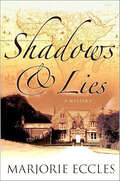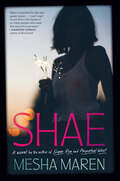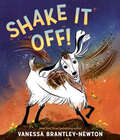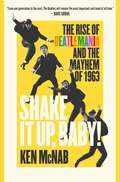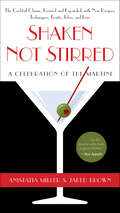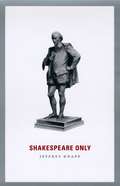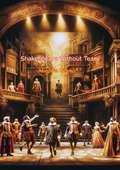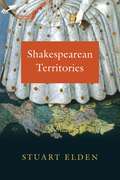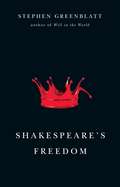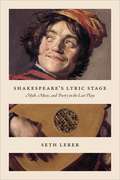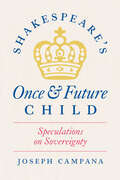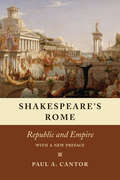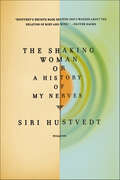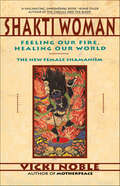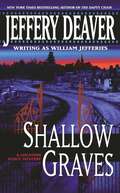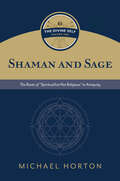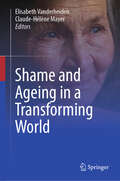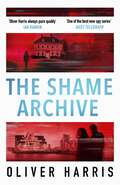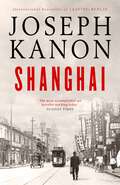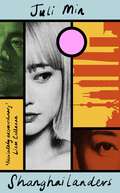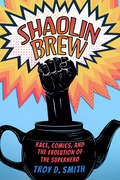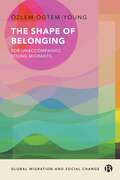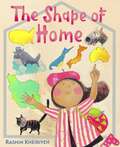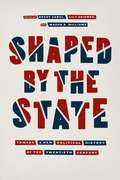- Table View
- List View
Shadows & Lies: A Mystery
by Marjorie EcclesFollowing the huge success of The Shape of Sand, shortlisted for the CWA Historical Dagger award, comes this dramatic story of love, war, and intrigue.It is the year 1910 and the bloodstained body of an unknown woman is found on the grounds of Sir Henry Chetwynd's Shropshire estate. A reluctant heir to the estate, Sebastian Chetwynd is already battling with divided loyalties: his ambition for a career of his own and his father's expectation that he follow in his footsteps, and his duty to marry for money when he is in love with Louisa, a student doctor and supporter of women's rights.Unknown to the Chetwynds, there is Hannah, living in London, who has lost her memory of everything that happened in the dozen years previous to a serious accident. In an attempt to unravel her past, Hannah writes down the story of her life as far as she can remember it. As she reaches out to grasp and piece together the fragments of those missing years, it seems that the ongoing murder investigation in Shropshire could hold the key.Switching between troubled South Africa in the last years of the nineteenth century and the murder in England ten years later, Marjorie Eccles's delicate narrative reveals the lies and deceptions that have lain beneath the veneer of polite Edwardian society.
Shae: A Novel
by Mesha MarenFrom &“a highest-order storyteller of Southern noir&” (Electric Literature), a queer coming-of-age novel about addiction, belonging, and loving a place that doesn't always love you back. When sixteen-year-old Shae meets Cam, who is new to their small town in West Virginia, she thinks she has found someone who is everything she has ever wanted in a companion. The two become fast friends, and then more. And when Shae ends up pregnant, Cam begins a different transition—trying on clothes that Shae can no longer fit into and using female pronouns. Shae tries to be fully supportive as Cam becomes the person she wants and needs to be. After a traumatic C-section and the birth of their daughter, Eva, Shae is given opioids to manage the intense pain. During the first year of Eva&’s life, Shae&’s dependence shifts from pain management to addiction, and her days begin to revolve around getting more pills. In the heart of West Virginia, opioids are dispensed as freely as candy, and Shae is just one of many to fall victim to addiction. Meanwhile, as Cam continues to transition, she embraces new relationships and faces the reality of being a trans woman in rural America. Shae is as much about these two young women as it is about the home they both love despite its limitations. Following the acclaimed Sugar Run and Perpetual West, this is Mesha Maren&’s most intense and intimate novel yet.
Shake It Off!
by Vanessa Brantley-NewtonThe whimsical tale of a clever little goat who rises above everything that threatens to keep her downMeet a sweet, curious little goat, who loves to sing and climb on everything. Some neighbors find her annoying, but nothing can keep her down—even when she gets stuck in a well and it looks like she&’s doomed. When everyone has given up on her, the clever goat surprises them all by taking advantage of her precarious predicament to win the day!Inspired by Vanessa Brantley-Newton&’s own experiences with adversity, this playful story about persistence, determination, and thinking outside the box is sure to make readers cheer.
Shake It Up, Baby!: The Rise of Beatlemania and the Mayhem of 1963
by Ken McNabA vivid, captivating account of the Beatles&’s musical transformation throughout the pivotal year of 1963, as the world became caught up in the maelstrom of Beatlemania and its far-reaching cultural impact. The Beatles broke up more than half a century ago, yet millions around the globe are still drawn to the legacy of four lads from Liverpool. From the carefree innocence of "A Hard Day's Night" to the experimental psychedelia of "Lucy In The Sky With Diamonds,&” their message of love, peace, and hope still resonates. In Shake It Up, Baby! we go back to the start—to 1963, when they went from playing in small clubs in the remote Scottish Highlands to four number one singles, two number one albums, three national tours, and being besieged by thousands of fans at gigs all over Britain. Ken McNab tells the story through gripping, exclusive eye-witness accounts from those who were there: the Beatlemaniacs, the journalists, broadcasters, and television producers who were scrambling to make sense of it all—and the other bands who could only watch in awe as the Beatles went from bottom of the bill to headline act to the biggest band on the planet, forever transforming musical history.
Shaken Not Stirred: A Celebration of the Martini
by Anistatia R. Miller Jared BrownThis updated edition features recipes from the world's greatest mixologists, including 107 classic gin and vodka Martinis, more than 110 Modern Martinis, and a directory of the world's best Martini loungesShaken Not Stirred® celebrates the Martini—the quintessential cocktail, the crowning jewel of civilized decadence. Historians and mixologists Anistatia Miller and Jared Brown revise their lists of classic Martini recipes and update their roster of modern Martinis— from the Espresso Martini to the Fresh Fruit Martini, from Cosmos to MarTEAnis—to suit current taste. They also provide eye-opening, never-before-published discoveries in their history of the cocktail in both America and Europe.Over the past fifteen years the way people think about and drink cocktails, especially Martinis, has been radically transformed. In this new edition, readers can hone their bar skills with tips from some of the world's finest mixologists. They can learn how to stock a topshelf home bar as well as make infusions and special garnishes. Partyplanning advice, fun bits of trivia, a few jokes and anecdotes, plus a directory of the world's best cocktail bars, are the finishing garnish on this modern cocktail classic!
Shakespeare Only
by Jeffrey KnappThree decades of controversy in Shakespeare studies can be summed up in a single question: Was Shakespeare one of a kind? On one side of the debate are the Shakespeare lovers, the bardolatrists, who insist on Shakespeare’s timeless preeminence as an author. On the other side are the theater historians who view modern claims of Shakespeare’s uniqueness as a distortion of his real professional life. In Shakespeare Only, Knapp draws on an extraordinary array of historical evidence to reconstruct Shakespeare’s authorial identity as Shakespeare and his contemporaries actually understood it. He argues that Shakespeare tried to adapt his own singular talent and ambition to the collaborative enterprise of drama by imagining himself as uniquely embodying the diverse, fractious energies of the popular theater. Rewriting our current histories of authorship as well as Renaissance drama, Shakespeare Only recaptures a sense of the creative force that mass entertainment exerted on Shakespeare and that Shakespeare exerted on mass entertainment.
Shakespeare Without Tears
by Margaret Webster"Shakespeare Without Tears" by Margaret Webster is an enlightening and accessible guide that demystifies the works of William Shakespeare, making them enjoyable and understandable for readers of all backgrounds. Webster, a renowned director, actress, and Shakespearean scholar, draws upon her extensive experience in the theatre to offer insights that bring Shakespeare's plays and characters to life.In this engaging book, Webster breaks down the complexities of Shakespeare's language, themes, and historical context with clarity and wit. She provides practical advice on how to read, interpret, and appreciate Shakespeare's works, whether for personal enjoyment or academic study. Her passion for the Bard's plays is evident on every page, as she shares anecdotes from her own career and offers tips for both performers and audiences.The book also includes analyses of specific plays, such as "Hamlet," "Macbeth," "Othello," and "A Midsummer Night's Dream," highlighting key scenes and passages to illustrate Webster's points. Her insights are grounded in a deep respect for Shakespeare's genius, combined with a practical understanding of how his works can be enjoyed by contemporary audiences. She covers a wide range of topics, including the structure of Shakespeare's plays, the nuances of his characters, and the timeless relevance of his themes."Shakespeare Without Tears" is a delightful and informative resource that invites readers to explore the richness of Shakespeare's oeuvre without intimidation. Margaret Webster's expertise and enthusiasm make this book an invaluable tool for unlocking the joy and wisdom found in Shakespeare's timeless masterpieces.
Shakespearean Territories
by Stuart EldenShakespeare was an astute observer of contemporary life, culture, and politics. The emerging practice of territory as a political concept and technology did not elude his attention. In Shakespearean Territories, Stuart Elden reveals just how much Shakespeare’s unique historical position and political understanding can teach us about territory. Shakespeare dramatized a world of technological advances in measuring, navigation, cartography, and surveying, and his plays open up important ways of thinking about strategy, economy, the law, and colonialism, providing critical insight into a significant juncture in history. Shakespeare’s plays explore many territorial themes: from the division of the kingdom in King Lear, to the relations among Denmark, Norway, and Poland in Hamlet, to questions of disputed land and the politics of banishment in Richard II. Elden traces how Shakespeare developed a nuanced understanding of the complicated concept and practice of territory and, more broadly, the political-geographical relations between people, power, and place. A meticulously researched study of over a dozen classic plays, Shakespearean Territories will provide new insights for geographers, political theorists, and Shakespearean scholars alike.
Shakespeare's Freedom (Campbell Lectures)
by Stephen GreenblattShakespeare lived in a world of absolutes—of claims for the absolute authority of scripture, monarch, and God, and the authority of fathers over wives and children, the old over the young, and the gentle over the baseborn. With the elegance and verve for which he is well known, Stephen Greenblatt, author of the best-selling Will in the World, shows that Shakespeare was strikingly averse to such absolutes and constantly probed the possibility of freedom from them. Again and again, Shakespeare confounds the designs and pretensions of kings, generals, and churchmen. His aversion to absolutes even leads him to probe the exalted and seemingly limitless passions of his lovers. Greenblatt explores this rich theme by addressing four of Shakespeare’s preoccupations across all the genres in which he worked. He first considers the idea of beauty in Shakespeare’s works, specifically his challenge to the cult of featureless perfection and his interest in distinguishing marks. He then turns to Shakespeare’s interest in murderous hatred, most famously embodied in Shylock but seen also in the character Bernardine in Measure for Measure. Next Greenblatt considers the idea of Shakespearean authority—that is, Shakespeare’s deep sense of the ethical ambiguity of power, including his own. Ultimately, Greenblatt takes up Shakespearean autonomy, in particular the freedom of artists, guided by distinctive forms of perception, to live by their own laws and to claim that their creations are singularly unconstrained. A book that could only have been written by Stephen Greenblatt, Shakespeare’s Freedom is a wholly original and eloquent meditation by the most acclaimed and influential Shakespearean of our time.
Shakespeare's Lyric Stage: Myth, Music, and Poetry in the Last Plays
by Seth LererWhat does it mean to have an emotional response to poetry and music? And, just as important but considered less often, what does it mean not to have such a response? What happens when lyric utterances—which should invite consolation, revelation, and connection—somehow fall short of the listener’s expectations? As Seth Lerer shows in this pioneering book, Shakespeare’s late plays invite us to contemplate that very question, offering up lyric as a displaced and sometimes desperate antidote to situations of duress or powerlessness. Lerer argues that the theme of lyric misalignment running throughout The Tempest, The Winter’s Tale, Henry VIII, and Cymbeline serves a political purpose, a last-ditch effort at transformation for characters and audiences who had lived through witch-hunting, plague, regime change, political conspiracies, and public executions. A deep dive into the relationship between aesthetics and politics, this book also explores what Shakespearean lyric is able to recuperate for these “victims of history” by virtue of its disjointed utterances. To this end, Lerer establishes the concept of mythic lyricism: an estranging use of songs and poetry that functions to recreate the past as present, to empower the mythic dead, and to restore a bit of magic to the commonplaces and commodities of Jacobean England. Reading against the devotion to form and prosody common in Shakespeare scholarship, Lerer’s account of lyric utterance’s vexed role in his late works offers new ways to understand generational distance and cultural change throughout the playwright’s oeuvre.
Shakespeare's Once and Future Child: Speculations on Sovereignty
by Joseph CampanaA study of Shakespeare’s child figures in relation to their own political moment, as well as our own. Politicians are fond of saying that “children are the future.” How did the child become a figure for our political hopes? Joseph Campana’s book locates the source of this idea in transformations of childhood and political sovereignty during the age of Shakespeare, changes spectacularly dramatized by the playwright himself. Shakespeare’s works feature far more child figures—and more politically entangled children—than other literary or theatrical works of the era. Campana delves into this rich corpus to show how children and childhood expose assumptions about the shape of an ideal polity, the nature of citizenship, the growing importance of population and demographics, and the question of what is or is not human. As our ability to imagine viable futures on our planet feels ever more limited, and as children take up legal proceedings to sue on behalf of the future, it behooves us to understand the way past child figures haunt our conversations about intergenerational justice. Shakespeare offers critical precedents for questions we still struggle to answer.
Shakespeare's Rome: Republic and Empire
by Paul A. CantorFor more than forty years, Paul Cantor’s Shakespeare’s Rome has been a foundational work in the field of politics and literature. While many critics assumed that the Roman plays do not reflect any special knowledge of Rome, Cantor was one of the first to argue that they are grounded in a profound understanding of the Roman regime and its changes over time. Taking Shakespeare seriously as a political thinker, Cantor suggests that his Roman plays can be profitably studied in the context of the classical republican tradition in political philosophy. In Shakespeare’s Rome, Cantor examines the political settings of Shakespeare’s Roman plays, Coriolanus and Antony and Cleopatra, with references as well to Julius Caesar. Cantor shows that Shakespeare presents a convincing portrait of Rome in different eras of its history, contrasting the austere republic of Coriolanus, with its narrow horizons and martial virtues, and the cosmopolitan empire of Antony and Cleopatra, with its “immortal longings” and sophistication bordering on decadence.
The Shaking Woman, or A History of My Nerves
by Siri HustvedtIn this unique neurological memoir Siri Hustvedt attempts to solve her own mysterious conditionWhile speaking at a memorial event for her father in 2006, Siri Hustvedt suffered a violent seizure from the neck down. Despite her flapping arms and shaking legs, she continued to speak clearly and was able to finish her speech. It was as if she had suddenly become two people: a calm orator and a shuddering wreck. Then the seizures happened again and again. The Shaking Woman or A History of My Nerves tracks Hustvedt's search for a diagnosis, one that takes her inside the thought processes of several scientific disciplines, each one of which offers a distinct perspective on her paroxysms but no ready solution. In the process, she finds herself entangled in fundamental questions: What is the relationship between brain and mind? How do we remember? What is the self? During her investigations, Hustvedt joins a discussion group in which neurologists, psychiatrists, psychoanalysts, and brain scientists trade ideas to develop a new field: neuropsychoanalysis. She volunteers as a writing teacher for psychiatric in-patients at the Payne Whitney clinic in New York City and unearths precedents in medical history that illuminate the origins of and shifts in our theories about the mind-body problem. In The Shaking Woman, Hustvedt synthesizes her experience and research into a compelling mystery: Who is the shaking woman? In the end, the story she tells becomes, in the words of George Makari, author of Revolution in Mind, "a brilliant illumination for us all."
Shakti Woman: Feeling Our Fire, Healing Our World
by Vicki NobleFrom the author of the classic Motherpeace – an inspiring and practical guide for awakening women's shamanic healing powers to heal ourselves and our planet.
Shallow Graves (John Pellam #1)
by Jeffery DeaverFrom The Bone Collector to the brand-new James Bond masterwork, &“there is no thriller writer today like Jeffery Deaver&”(San Jose Mercury News)!John Pellam had a promising career as a Hollywood stuntman, until a tragedy sidetracked him. Now he&’s a divorced, hard-living location scout who travels the country in search of shooting sites, and pulling his camper into any small town brings out the locals seeking their fifteen minutes of fame. But behind an idyllic locale in upstate New York is a hotbed of violence, lust, and conspiracy, and Pellam is thrust into the heart of an unfolding drama and the search for a killer when a brutal murder has him hunting down justice on behalf of a dear friend.
Shaman and Sage: The Roots of “Spiritual but Not Religious” in Antiquity
by Michael HortonThe first volume of Michael Horton&’s magisterial intellectual history of &“spiritual but not religious&” as a phenomenon in Western culture Discussions of the rapidly increasing number of people identifying as &“spiritual but not religious&” tend to focus on the past century. But the SBNR phenomenon and the values that underlie it may be older than Christianity itself. Michael Horton reveals that the hallmarks of modern spirituality—autonomy, individualism, utopianism, and more—have their foundations in Greek philosophical religion. Horton makes the case that the development of the shaman figure in the Axial Age—particularly its iteration among Orphists—represented a &“divine self.&” One must realize the divinity within the self to break free from physicality and become one with a panentheistic unity. Time and time again, this tradition of divinity hiding in nature has arisen as an alternative to monotheistic submission to a god who intervenes in creation. This first volume traces the development of a utopian view of the human individual: a divine soul longing to break free from all limits of body, history, and the social and natural world. When the second and third volumes are complete, students and scholars will consult The Divine Self as the authoritative guide to the &“spiritual but not religious&” tendency as a recurring theme in Western culture from antiquity to the present.
Shame and Ageing in a Transforming World
by Elisabeth Vanderheiden Claude-Hélène MayerThe book provides a comprehensive overview of research and concepts related to shame and ageing, in the context of social change, upheavals and paradigm shifts, from transdisciplinary, cultural and transcultural perspectives. Drawing upon the editors' previous works on the topic of shame, this volume discusses the contexts of shame and ageing from theoretical, conceptual, and empirical perspectives. The toxic and stressful aspects of shame have been the focus of scientific analysis and discourse on shame and ageing. This volume explicitly makes the dimensions of shame a resource for individuals, and collective transformation processes the object of research in the context of ageing. It looks at emerging lifestyle, political, socio-economic and health contexts. It looks at how and why the frequency, intensity and handling of feelings of shame change over the course of life; the impact of shame on emotional well-being and mental health of older people; the impact of shame on social relationships and social engagement of older people in different cultures; the role of cultural values and norms in the development and processing of feelings of shame, especially in older people, and how these can be used for self-development; and the differences in the way older people in different cultures deal with feelings of shame and the way these can be used to develop effective strategies and techniques for older people to cope with shame. The editors and contributors thereby take cultural and gender aspects, as well as positive psychology and resource-orientated concepts, such as salutogenesis, resilience, happiness, fortitude, locus of control, faith- or strengths-based approaches into account and contextualize them against processes of social upheaval and transformation.
The Shame Archive: 'Captivating and horrifying' Manda Scott
by Oliver Harris'Captivating and horrifying at once, a completely plausible evocation of the putrid morass that is the British Establishment and its craven capitulation to Russian money - or indeed, any money. Oliver Harris is squarely in the territory of the greats: Greene and le Carré but also the modern masters, Mick Herron and Adam Brookes. There can be no higher accolade' Manda ScottHow does a secret service confront its past, when its secrets must never be revealed?Buried deep in MI6's digital archives is the most classified directory of all. It doesn't contain war plans or agent profiles, but shame: the misdeeds of politicians, royalty, business leaders and the service's own personnel.There are seven decades' worth of images and recordings, usually acquired for the sake of assessing risk, sometimes as a guard against betrayal, often engineered by MI6 for their own purposes. They are the most sensitive two thousand terabytes of data in the Service's possession. When material from the archive begins appearing online, panic spreads through the Establishment like wildfire. At first, the security breach only manifests itself in apparently random events: a suicide, a disappearance, a breakdown. But when it's discovered that the individuals concerned were all contacted by the same anonymous person, a connection comes into focus. The archive has been leaked. The hunt is now of unprecedented urgency before the entire political and business systems are fatally weakened. That's when they call for Elliot Kane...
Shane Comes Home
by Rinker BuckOn March 21, 2003, while leading a rifle platoon into combat, Marine Lieutenant Shane Childers became the first combat fatality of the Iraq War. In this gripping, beautifully written personal history, award-winning writer Rinker Buck chronicles Shane's death and his life, exploring its meaning for his family, his fellow soldiers, and the country itself. It is the story of an intelligent, gifted soldier who embodied the soul of today's all-volunteer warrior class; of the town of Powell, Wyoming, which had taken Shane into its heart; and of the Marine detail sent to deliver the news to the Childers family and the extraordinary connection that formed between them.At once an inspiring account of commitment to the military and a moving story of family and devotion, Shane Comes Home rises above politics to capture the life of a remarkable young man who came to symbolize the heart of America during a difficult time.
Shanghai: A gripping new wartime thriller from 'the most accomplished spy novelist working today' (Sunday Times)
by Joseph Kanon'Heart-poundingly suspenseful' WASHINGTON POST 'Joseph Kanon owns this corner of the literary landscape' LEE CHILD Daniel Lohr, sensing that the Nazis are closing in on the Jews, leaves his dying father in Berlin and boards a ship to Shanghai. His passage is dependent upon him delivering a package to his shady uncle, his father&’s brother, upon arrival. Daniel has no idea what the package contains. On board is Leah, also fleeing the Nazis. She and Daniel conduct a passionate but brief shipboard affair, but are separated as soon as the ship docks in Shanghai. Will he ever see her again? Daniel is immediately plunged into his uncle&’s seductive and corrupt world, and becomes involved in the launch of a new nightclub, the biggest, best and most glitzy in town. When violence breaks out and lives are at risk, he finds himself drawn irrevocably into the terrifying underworld that is wartime Shanghai.Beautifully atmospheric and intricately plotted, this masterful thriller marks exciting new ground for an author hailed by the Sunday Times as &‘the most accomplished spy novelist working today&’.PRAISE FOR JOSEPH KANON: 'Kanon is fast approaching the complexity and relevance not just of le Carré and Greene but even of Orwell' New York Times 'Joseph Kanon continues to demonstrate that he is up there with the very best . . . he is the master of the shadows of the era' The Times 'Sensational! No one writes period fiction with the same style and suspense – not to mention substance – as Joseph Kanon' Scott Turow 'Thoroughly absorbing, a thoughtful and subtle evocation of a place and era' Sunday Telegraph 'The perfect combination of intrigue and accurate history brought to life' Alan Furst
Shanghailanders
by Juli Min"I think love is when you think you need someonefor your survival. Survival, defined broadly.""The way you think, sometimes . . .""The way I think, what?""It . . . surprises me. Yoko, we need each other. Family - familyis all we have."'Smart, tender, and lyrical-SHANGHAILANDERS is a moving debut novel, and one that never stops surprising the reader . . . This is the kind of book I wish I'd read when I first was learning to write.' Jiaming Tang, author of CINEMA LOVE While the years rewind from 2040 back to 2014, Shanghailanders brings readers into the shared and separate lives of the Yang family, parent by parent, daughter by daughter, and through the eyes of the people in their orbit-a nanny from the provinces, a private driver with a penchant for danger, and a grandmother whose memories of the past echo the present. As they build their lives in this old, futuristic city, we see Leo, his wife Eko and their daughters Yumi, Yoko and Kiko trip over their own desires in their bids to connect with one another, in their attempts to be a family.Though the world shifts and brings change for each of the Yangs, universal constants remain: love is complex and family will always be stubbornly connected by blood, secrets, and longing. Dazzlingly constructed and achingly resonant, Shanghailanders is an unforgettable exploration of everything that follows 'happily ever after'-and the ways a family makes and remakes itself across the years.'A wonderful and wildly smart and compelling book. If Shanghai is the future, this terrific novel knows it all.' Joan Silber
Shaolin Brew: Race, Comics, and the Evolution of the Superhero
by Troy D. SmithShaolin Brew: Race, Comics, and the Evolution of the Superhero looks at how the comic book industry developed from a white perspective and how minority characters were and are viewed through a stereotypical white gaze. Further, the book explores how voices of color have launched a shift in the industry, taking nonwhite characters who were originally viewed through a white lens and situating them outside the framework of whiteness. The financial success of Blaxploitation and Kung Fu films in the early 1970s led to major comics publishers creating, for the first time, Black and Asian superhero characters who headlined their own comics. The introduction of Black and Asian main characters, who previously only served as guest stars or sidekicks, launched a new kind of engagement between comics companies and minority characters and readers. However, scripted as they were by white writers, these characters were mired in stereotypes. Author Troy D. Smith focuses on Asian, Black, and Latinx representation in the comic industry and how it has evolved over the years. Smith explores topics that include Orientalism, whitewashing, Black respectability politics, the model minority myth, and political controversies facing fandoms. In particular, Smith examines how fans take the superheroes they grew up with—such as Luke Cage, Black Lightning, and Shang Chi—and turn them into the characters they wished they had as children. Shaolin Brew delves into the efforts of fans of color who urged creators to make these characters more realistic. This refining process increased as more writers and artists of color broke into the industry, bringing their own perspectives to the characters. As many of these characters transitioned from page to screen, a new generation of writers, artists, and readers have cooperated to evolve one-dimensional stereotypes into multifaceted, dynamic heroes.
The Shape of Belonging for Unaccompanied Young Migrants (Global Migration and Social Change)
by Özlem Ögtem-YoungUnaccompanied children and adolescents seeking protection in the UK are among the most vulnerable migrant groups, and often find themselves in a hostile policy environment after enduring traumatic journeys. This book offers an in-depth analysis of the lived experiences of belonging, and the politics and policies of migration. Focusing on unaccompanied young migrants, it investigates the conditions and nature of belonging in the face of the uncertainty, ambiguity and violence of the UK asylum system. Drawing on interviews and the Deleuzo-Guattarian concepts of assemblage, the book provides an empirical and theoretical examination of the belonging of unaccompanied young migrants seeking protection in the UK. Through compelling accounts, the author portrays the complex and paradoxical nature of belonging under precarious conditions, shedding light on the tenacity and fragility of belonging for unaccompanied young migrants.
The Shape of Home
by Rashin Kheiriyeh"A joyful, wildly imaginative book" —The New York Times It’s Rashin’s first day of school in America! Everything is a different shape than what she’s used to: from the foods on her breakfast plate to the letters in the books! And the kids' families are from all over! The new teacher asks each child to imagine the shape of home on a map. Rashin knows right away what she’ll say: Iran looks like a cat! What will the other kids say? What about the country YOUR family is originally from? Is it shaped like an apple? A boot? A torch? Open this book to join Rashin in discovering the true things that shape a place called home. P R A I S E ★ "A creative, child-centered picture book about finding a new home after immigration. Ebulliently illustrated." —Kirkus (starred) ★ "It’s hard to find a more joyful take on the first day of school in a new country than that found in Kheiriyeh’s new work." —School Library Journal (starred) ★ "Exuberant...A warm and welcoming story about a group of children who may have come from other places but have found a classroom that is ‘shaped like a home.’" —Booklist (starred)
Shaped by the State: Toward a New Political History of the Twentieth Century
by Lily Geismer Mason B. Williams Brent CebulAmerican political history has been built around narratives of crisis, in which what “counts” are the moments when seemingly stable political orders collapse and new ones rise from the ashes. But while crisis-centered frameworks can make sense of certain dimensions of political culture, partisan change, and governance, they also often steal attention from the production of categories like race, gender, and citizenship status that transcend the usual break points in American history. Brent Cebul, Lily Geismer, and Mason B. Williams have brought together first-rate scholars from a wide range of subfields who are making structures of state power—not moments of crisis or partisan realignment—integral to their analyses. All of the contributors see political history as defined less by elite subjects than by tensions between state and economy, state and society, and state and subject—tensions that reveal continuities as much as disjunctures. This broader definition incorporates investigations of the crosscurrents of power, race, and identity; the recent turns toward the history of capitalism and transnational history; and an evolving understanding of American political development that cuts across eras of seeming liberal, conservative, or neoliberal ascendance. The result is a rich revelation of what political history is today.
